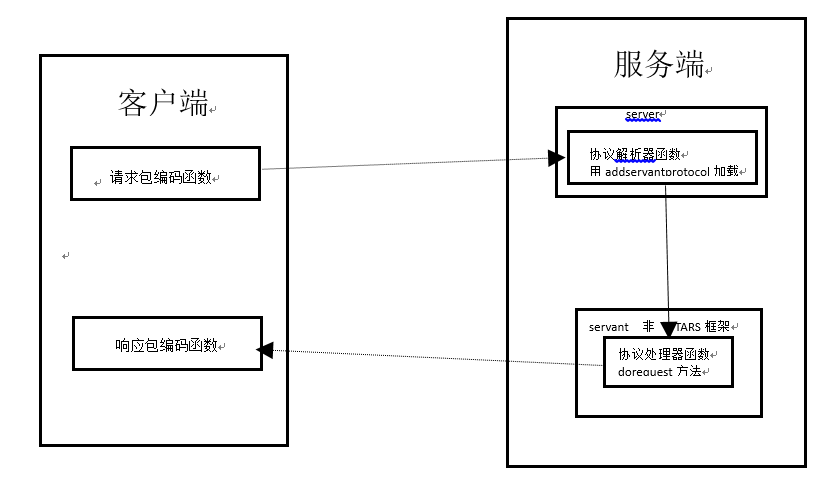5.5 KiB
其他协议支持
概述
TARS服务框架默认情况下只支持TARS自有的tars协议,但是在实际的应用场景中,需要在TARS服务框架中支持其他协议,例如HTTP,这种情况下就不能用通信器来发送据,需要业务自己来实现这部分代码。对于自定义的协议, 处理方式也类似
具体程序示例,参见examples/httpDemo/.
开发第三方协议服务端,要实现协议解析器并将其加载到服务中,同时需要建立一个非TAF框架的服务对象,该类继承于Servant类,通过重载Servant类中的doRequest方法来建立协议处理器。 而客户端要访问服务,需要通过调用proxy的rpc函数,在调用之前,要为proxy设置请求包编码函数和响应包解码函数。
图中的黑色线代表了数据流向:数据(客户端)-〉请求包的编码器(客户端)-〉协议解析器(服务端)-〉doRequest协议处理器(服务端)-〉生成返回数据(服务端)-〉响应包的解码器(客户端)-〉响应数据(客户端)
其中请求包的编码器(客户端)负责对客户端发送的数据进行打包,协议解析器(服务端)负责对收到的数据进行解析并交给协议处理器(服务端)去处理并生成返回数据,而响应包的解码器(客户端)负责对返回的数据进行解码。
服务端Http协议实例
/usr/local/tars/cpp/script/create_tars_server.sh TestApp HttpServer Http
在目录下会生成六个文件,将http.tars 删除(因为不是tars协议),然后手动的实现一些方法
以HelloServer为例,需要支持http协议
在HttpImp中修改继承自Servant类的doRequest方法,该方法为第三方服务的处理器,该处理器负责处理协议解析器传送给其的数据,并负责生成返回给客户端的response
HttpImp.h
#ifndef _HttpImp_H_
#define _HttpImp_H_
#include "servant/Application.h"
/**
*
*
*/
class HttpImp : public Servant
{
public:
/**
*
*/
virtual ~HttpImp() {}
/**
*
*/
virtual void initialize();
/**
*
*/
virtual void destroy();
/**
*
*/
int doRequest(TarsCurrentPtr current, vector<char> &buffer);
};
/////////////////////////////////////////////////////
#endif
HttpImp.cpp
#include "HttpImp.h"
#include "servant/Application.h"
using namespace std;
//////////////////////////////////////////////////////
void HttpImp::initialize()
{
//initialize servant here:
//...
}
//////////////////////////////////////////////////////
void HttpImp::destroy()
{
//destroy servant here:
//...
}
int HttpImp::doRequest(TarsCurrentPtr current, vector<char> &buffer)
{
TC_HttpRequest request;
vector<char> v = current->getRequestBuffer();
string sBuf;
sBuf.assign(&v[0],v.size());
request.decode(sBuf);
TC_HttpResponse rsp;
string s="hello";
rsp.setResponse(s.c_str(),s.size());
rsp.encode(buffer);
return 0;
}
在其中HttpServer类的initialize(),加载服务对象HttpImp,并设置第三方协议解析器parse。 我们在函数中实现HttpProtocol::parse函数,用于解析协议。
#ifndef _HttpServer_H_
#define _HttpServer_H_
#include <iostream>
#include "servant/Application.h"
using namespace tars;
/**
*
**/
class HttpServer : public Application
{
public:
/**
*
**/
virtual ~HttpServer() {};
/**
*
**/
virtual void initialize();
/**
*
**/
virtual void destroyApp();
};
extern HttpServer g_app;
////////////////////////////////////////////
#endif
#include "HttpServer.h"
#include "HttpImp.h"
using namespace std;
HttpServer g_app;
/////////////////////////////////////////////////////////////////
struct HttpProtocol
{
/**
* 解析http请求
* @param in
* @param out
*
* @return int
*/
static int parseHttp(string &in, string &out)
{
try
{
//判断请求是否是HTTP请求
bool b = TC_HttpRequest ::checkRequest(in.c_str(), in.length());
//完整的HTTP请求
if(b)
{
out = in;
in = "";
//TLOGDEBUG("out size: " << out.size() << endl);
return TC_EpollServer::PACKET_FULL;
}
else
{
return TC_EpollServer::PACKET_LESS;
}
}
catch(exception &ex)
{
return TC_EpollServer::PACKET_ERR;
}
return TC_EpollServer::PACKET_LESS; //表示收到的包不完全
}
};
void
HttpServer::initialize()
{
//initialize application here:
//...
addServant<HttpImp>(ServerConfig::Application + "." + ServerConfig::ServerName + ".HttpObj");
addServantProtocol(ServerConfig::Application + "." + ServerConfig::ServerName + ".HttpObj",&HttpProtocol::parseHttp);
}
/////////////////////////////////////////////////////////////////
void
HttpServer::destroyApp()
{
//destroy application here:
//...
}
/////////////////////////////////////////////////////////////////
int
main(int argc, char* argv[])
{
try
{
g_app.main(argc, argv);
g_app.waitForShutdown();
}
catch (std::exception& e)
{
cerr << "std::exception:" << e.what() << std::endl;
}
catch (...)
{
cerr << "unknown exception." << std::endl;
}
return -1;
}
/////////////////////////////////////////////////////////////////
